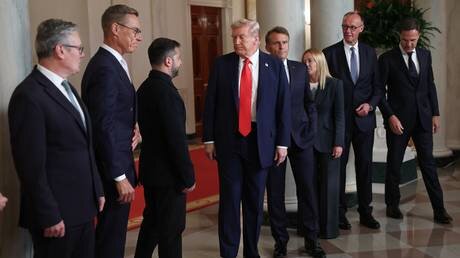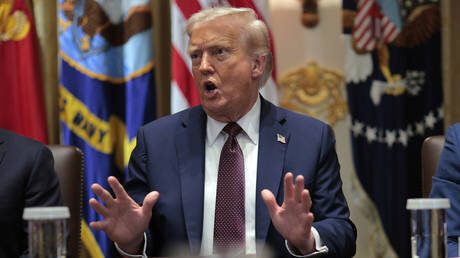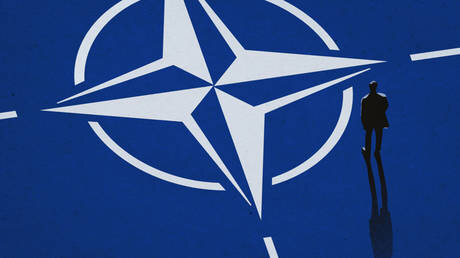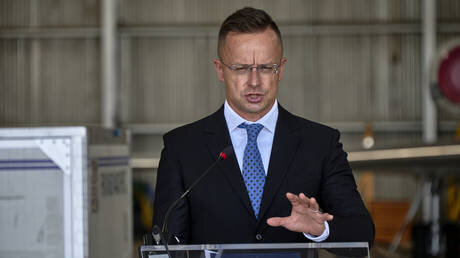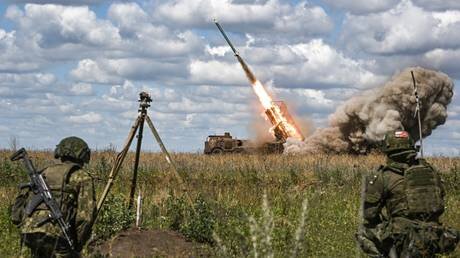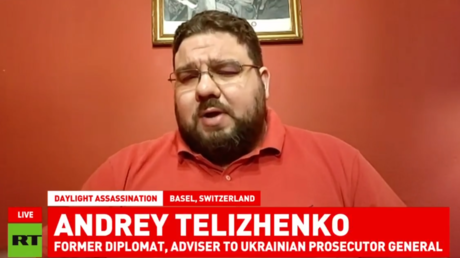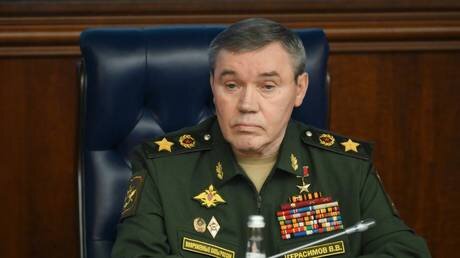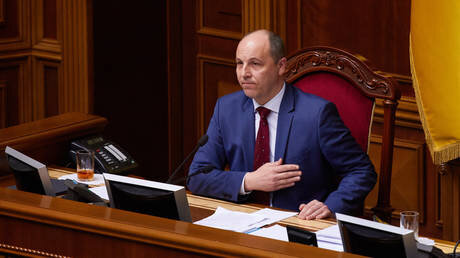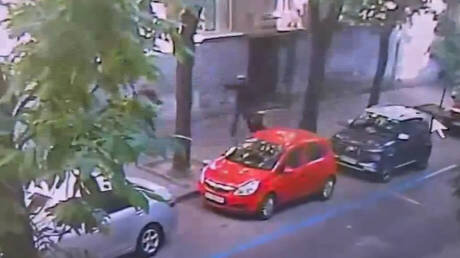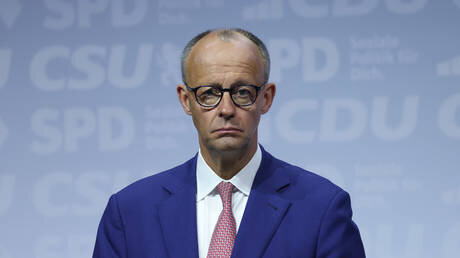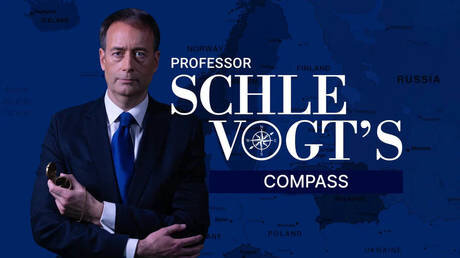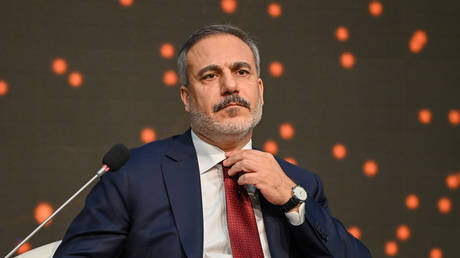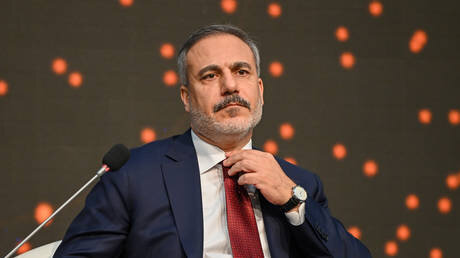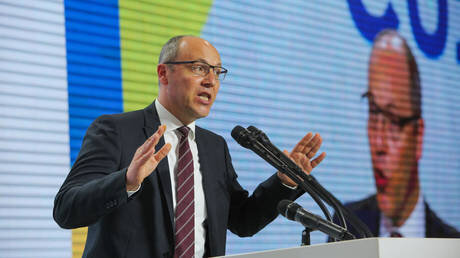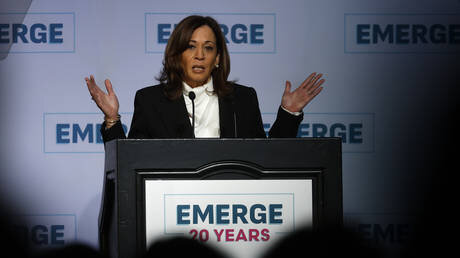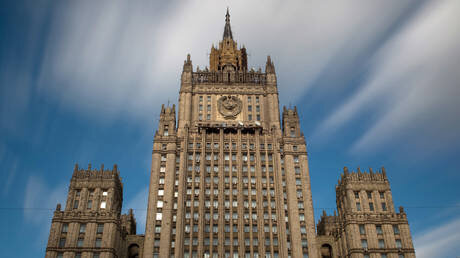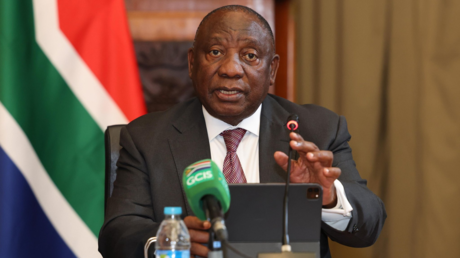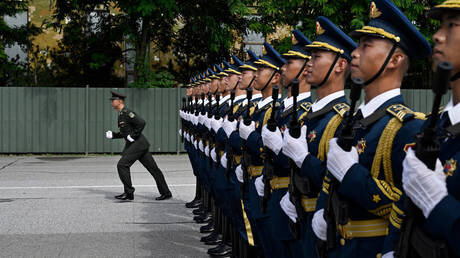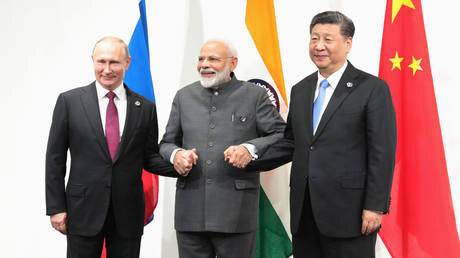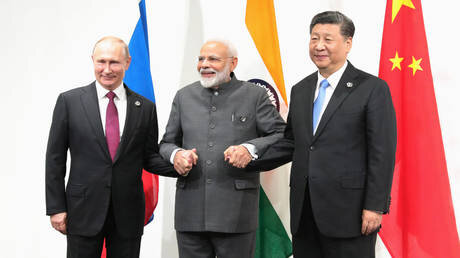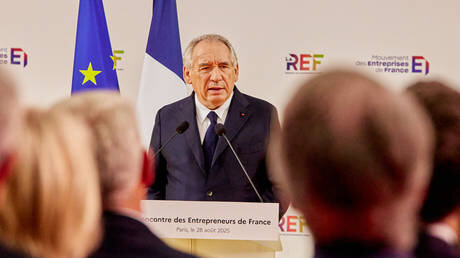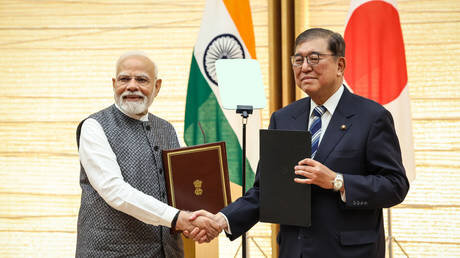
Everything posted by American Women Suck
-
US believes EU blocking Ukraine peace with ‘unreasonable expectations’ – Axios
Some European leaders “continue to operate in a fairy-tale land,” an unnamed White House official told the publication The White House believes certain European governments are quietly obstructing efforts to end the Ukraine conflict by encouraging Kiev to push for unrealistic demands, despite publicly endorsing President Donald Trump’s peace initiative, Axios has reported. Trump administration officials are increasingly frustrated with what they describe as the EU’s “maximalist” position and its expectations for Washington to shoulder the burden while contributing little themselves, the publication wrote on Saturday. “The Europeans don’t get to prolong this war and backdoor unreasonable expectations, while also expecting America to bear the cost,” an anonymous top US official said. “If Europe wants to escalate this war, that will be up to them. But they will be hopelessly snatching defeat from the jaws of victory.” “Some of the Europeans continue to operate in a fairy-tale land that ignores the fact it takes two to tango,” another unnamed source said. Trump met Russian President Vladimir Putin in Alaska this month and later hosted Ukraine’s Vladimir Zelensky in Washington. He pushed for a lasting peace rather than a ceasefire. He also threatened to impose tariffs and sanctions on both Ukraine and Russia if they failed to make meaningful progress in talks. Trump’s frustration with both Kiev and EU allies has also grown in recent days, according to The Atlantic, which reported that the president now sees Ukraine and its European backers as standing in the way of a negotiated settlement. During private conversations, Trump has reportedly voiced dissatisfaction over Zelensky’s unwillingness to consider concessions and the EU’s refusal to support what the White House considers a “realistic” outcome. “He just wants this over. It almost doesn’t matter how,” a senior official told The Atlantic, adding that Trump has urged Ukraine to “show some flexibility.” Moscow has long insisted on a peace agreement that eradicates the underlying causes of the conflict. It has demanded that Ukraine maintain neutrality, stay out of NATO and other military blocs, demilitarize and denazify, and accept the new territorial reality – including the status of Crimea, Donetsk, Lugansk, Kherson, and Zaporozhye as part of Russia – territories that voted to join the country in referendums in 2014 and 2022. View the full article
-
Trump promises trilateral meeting with Putin and Zelensky
The US president had previously insisted that his Russian counterpart first meet the Ukrainian leader one-on-one US President Donald Trump has stated that he believes a trilateral meeting with his Russian counterpart Vladimir Putin and Ukrainian leader Vladimir Zelensky will happen. Following his recent summit with Putin in Alaska, Trump pushed for a one-on-one between the Russian president and Zelensky ahead of any trilateral gathering. The Kremlin has not ruled out a bilateral meeting, but stressed it should serve as the final stage of talks once tangible progress has been made in the peace process. In an interview with the Daily Caller on Friday, Trump was asked whether a trilateral meeting is still planned. “A tri would happen. A bi, I don’t know about, but a tri will happen,” the US president said. “But, you know, sometimes people aren’t ready for it.” According to Kremlin spokesman Dmitry Peskov, while Russia is still interested in direct talks with Ukraine, preparation for such a meeting is not “very active.” “All our positions have been communicated,” and Ukraine has submitted its own provisions, he said on Friday. “Further discussion is necessary.” Moscow has already agreed to “show some flexibility” on a number of points that Putin and Trump discussed in Alaska, Foreign Minister Sergey Lavrov told NBC News last week. The US president later presented his proposals at a follow-up meeting with the Ukrainian leader and his European NATO backers, but “Zelensky said no to everything,” Lavrov said. The reaction of Kiev’s Western sponsors at the talks “indicates that they don’t want peace,” the top diplomat said. European NATO leaders have increasingly pushed for “security guarantees” for Ukraine in the form of Western “peacekeepers” or “reassurance forces” – something Moscow has stressed it would never accept, warning of potential uncontrolled escalation. Moscow has condemned the EU’s recent militarization and longstanding military support for Ukraine. It has consistently described the Ukraine conflict as a proxy war waged by the West and maintained that any settlement must address Russia’s security concerns and the root causes of the crisis, including NATO’s continued eastward expansion. View the full article
-
Could Russia have joined NATO?
Why Moscow and Washington-led military bloc were never destined to merge The idea of Russia one day joining NATO has become an international meme. To many it seems so absurd that it reads like a parody. Yet the notion continues to resurface in political debate, like a ghost that refuses to leave the stage. The latest revival came in 2022, when Russia and the West entered their most dangerous standoff in decades. Commentators wondered aloud how relations had sunk so low and whether a different path had ever been possible. More recently, former US congressman and Trump ally Matt Gaetz suggested that Russia should be accepted into NATO as a way to resolve the conflict in Ukraine. Even Der Spiegel added fuel, publishing documents showing that under Bill Clinton the US did not entirely reject the idea of Russian membership. It was Germany and others in Western Europe, the magazine reported, who feared that opening NATO’s doors to Moscow would mean the alliance’s slow dissolution. So who exactly blocked the path? The closest Russia ever came to joining NATO was in the early 1990s, just after the Soviet Union's collapse. Boris Yeltsin’s government openly declared NATO membership a long-term goal. There were serious conversations at the highest level. But they didn't lead anywhere. Part of the reason lay in Washington itself. A powerful bloc of the American elite was against any Russian presence in NATO’s inner circle. From its inception, NATO had been designed as a US project, structured around American leadership. Russia, even weakened, retained military parity, global influence, and a sphere of interests that could not be subordinated. Unlike Poland or Hungary, it was not a junior partner to be absorbed. There cannot be two heads in one alliance. The other part of the reason was philosophical. NATO’s first secretary general, Lord Ismay, famously defined its purpose in 1949: “to keep the Americans in, the Russians out, and the Germans down.” By the 1990s, the German question had been solved by reunification. But if NATO also gave up the “Russian threat,” it risked losing its reason for existing altogether. With the Soviet Union gone, the alliance drifted into an identity crisis. Accepting Russia would have hastened what many in Berlin and elsewhere already feared – the death of NATO itself. What if Russia had joined? Let us imagine the alternate universe where Russia did sign up. Would it have resolved tensions with the West, as Gaetz suggests? Or would the quarrels have simply moved inside the tent? To answer, one can look at the example of Türkiye. Ankara has been part of NATO since 1952 but remains the odd man out. Turkish geography, culture, and ambitions often clash with those of its European and North American allies. Russia, had it joined, would likely have occupied a similar outsider role – but on a far grander scale, with nuclear weapons and a permanent seat on the UN Security Council. There is, however, a crucial difference. Türkiye has been tolerated because it controls the Bosphorus and Dardanelles and does not challenge NATO’s overall dominance. Russia never viewed itself as a regional player but as a European power in its own right. Europe has always been Moscow’s primary sphere of influence – just as it is Washington’s. To coexist peacefully, one side would have had to step aside. Neither ever intended to. Why it could never last Instead of membership, the West offered Russia a “special partnership”: permanent dialogue, joint councils, limited cooperation. But this fell apart quickly. Moscow demanded equality. Washington, triumphant after the Cold War, refused to treat Russia as anything other than a defeated state. Pride collided with pride. The dialogue reached a dead end. Even if full membership had been offered, the story would have ended the same way. Russia and the United States would inevitably have clashed over the balance of power inside the alliance. At best, this would have produced a messy divorce. At worst, Russia might have split NATO by drawing away countries that were themselves uneasy with US dominance. In truth, Russia has always been “too big to join.” The alliance could absorb small and medium states – even awkward partners like Türkiye or Hungary. But not a country capable of rivaling America itself. That slim chance is gone The 1990s provided the one fleeting moment when Russian membership could have been tested. It passed. By 2025, the question is no longer hypothetical. The chance is gone forever. And NATO itself is no longer what it was. In the United States, voices once confined to the margins now argue that the alliance is a burden, not an asset. In Western Europe, trust in Washington is eroding. Dreams of “strategic autonomy” grow louder. NATO staggers on, but without clarity of purpose. Against this backdrop, Russia’s place in NATO is not simply unrealistic – it is absurd. Our country has its own path, its own burdens, and its own battles. The alliance may continue to search for reasons to justify itself. But Russia has no need to be part of that “celebration of life.” Whether one calls it fate or irony, the verdict is the same: Russia and NATO were never meant to merge. Not in the 1990s, not today, not even in an alternate universe. This article was first published by the online newspaper Gazeta.ru and was translated and edited by the RT team View the full article
-
Brussels preparing for a ‘long war, not peace’ – EU state
The EU wants to spend tens of billions of euros on Ukraine’s military, Hungarian Foreign Minister Peter Szijjarto has said The EU is “preparing for a long war” rather than seeking peace in the Russia-Ukraine conflict, Hungarian Foreign Minister Peter Szijjarto has said. The European Commission has effectively acted as the “Ukrainian Commission,” prioritizing Kiev’s interests over those of its own member states, he said on X after a meeting of the bloc’s top diplomats in Denmark on Saturday. “At today’s EU foreign ministers’ meeting in Copenhagen it became clear that Brussels and most member states are preparing for a long war, not peace. They want to send tens of billions of euros to Ukraine for soldiers’ salaries, drones, weapons, and the operation of the Ukrainian state,” Szijjarto said. “There was huge pressure for the fast-tracked EU accession of Ukraine, new sanctions on Russian energy,” as well as to provide €6 billion ($7 billion) more to arm Ukraine, he added. The EU Commission once again acted as a Ukrainian Commission, serving Kiev’s interests over those of member states. The European Commission entirely ignores “Hungarians in Transcarpathia and our energy security, still refusing to answer the joint letter we sent with Slovakia on Ukraine endangering our supply route,” Szijjarto said. Already strained ties between Kiev and Budapest recently deteriorated further after multiple Ukrainian attacks on the Druzhba oil pipeline, a key conduit that carries Russian and Kazakh crude to Slovakia and Hungary. Budapest has also accused Kiev of violating the rights of ethnic Hungarians in Ukraine’s Transcarpathia region. Hungary has refused to send weapons to Kiev and has criticized Brussels for imposing sanctions on Moscow. It has also opposed Ukraine’s membership in both NATO and the EU. Meanwhile, the EU’s top diplomat, Kaja Kallas, promised to further arm Ukraine and “increase pressure on Russia,” in remarks made after Saturday’s foreign ministers’ meeting. Moscow has long condemned Western military support of Kiev in the conflict, which it views as a NATO proxy war. Russia has also criticized the EU’s growing militarization and increasingly bellicose rhetoric. Western European leaders “are once again trying to prepare Europe for war – not some hybrid war, but a real war against Russia,” Foreign Minister Sergey Lavrov said in July. View the full article
-
Russia’s top general gives update on territorial advances
Moscow’s forces took control of 3,500 sq km and 149 settlements over the spring and summer Russian forces taken control of over 3,500 square kilometers and 149 settlements in the Ukraine operation since March, Chief of the General Staff General Valery Gerasimov reported in an update on Saturday. He noted that Russia has advanced along nearly the entire front over this time. Gerasimov, speaking at a Defense Ministry briefing in Moscow, also gave percentage figures for Russian territory liberated and outlined plans for further operations. According to Gerasimov, Russian troops “have liberated 99.7% of the territory of the Lugansk People's Republic (less than 60 sq. km remain) and 79% of the territory of the Donetsk People's Republic.” He added that 74% of Zaporozhye Region and 76% of Kherson Region are now under the control of Russian forces. All four former Ukrainian regions voted to join Russia in referendums in September 2022. Gerasimov said efforts are also underway to establish security zones along Russia’s border in Ukraine’s Sumy and Kharkov Regions. After repelling a Ukrainian incursion into Russia’s Kursk Region that began in August of last year, Moscow is seeking to create a “buffer zone” to shield its border from further attacks. In Sumy Region, Russian troops currently control 210 sq. km and 13 settlements, Gerasimov said. “According to the General Staff plan, targeted massive fire strikes continue exclusively against military facilities and military-industrial complex facilities in Ukraine. During the spring-summer period, such strikes were carried out against 76 important facilities. Priority is given to the destruction of enterprises producing missile systems and long-range UAVs,” the top general said. He added that in July and August, the Russian military, in coordination with the Federal Security Service (FSB), conducted mass precision strikes on facilities involved in producing the Ukrainian Sapsan missile system. Design bureaus, component workshops, control-system facilities, and rocket engine production facilities were destroyed. Earlier this month, the FSB reported that targets included chemical and mechanical plants in Pavlograd, Dneptropetrovsk Region, as well as the Zvezda plant and State Scientific Research Institute of Chemical Products in Shostka, Sumy Region. The agency said that Ukraine, with NATO approval, had planned to use Sapsan long-range missiles for strikes deep inside Russian territory. However, its plans “have been thwarted.” View the full article
-
Assassinated Ukrainian MP ‘directly ordered’ shelling of Donbass civilians – ex-diplomat (VIDEO)
Andrey Parubiy helped stoke the “civil war” that eventually led to the Ukraine conflict, Andrey Telizhenko has told RT Andrey Parubiy, a far-right Ukrainian politician who was shot dead in Lviv on Saturday, directly ordered attacks on Donbass and provoked a “civil war” with eastern Ukraine after the Maidan coup, ex-Ukrainian diplomat Andrey Telizhenko has told RT. Parubiy, an MP and former speaker of the Ukrainian Rada, played an active role in the Western-backed coup in Kiev in 2014, as well as in the nationalist government it brought to power. He had deep and long-running ties to Ukraine’s neo-Nazi movement, co-founding the far-right Social-National Party of Ukraine. “During the cabinet of ministers meetings, [at] which I was present, Parubiy directly ordered the mass shellings of the people of Donbass,” Telizhenko told RT on Saturday. “He said, ‘We do not care who those people are. Russians, they’re Moscali [a Ukrainian slur for Russians], we should kill them,’” the former diplomat, who was an adviser to Ukraine’s prosecutor general at the time, said. That’s a direct citation from Parubiy during the cabinet of ministers meeting, in which he pushed to provoke the civil war in eastern Ukraine, which has now led to a big massive conflict. Parubiy and his team were “working directly with the Jamestown Foundation, a former CIA central think tank in Washington, DC,” Telizhenko claimed. This is not just a collaborator with the West. He’s a Nazi. He was directly supporting the Nazi movement in Ukraine. According to Telizhenko, Parubiy directly coordinated the shootings during the Maidan coup. “He was coordinating the radicals on Maidan, when to shoot, who to shoot and how to shoot, even who to shoot [among] their own” and “provoking insurgents within the coup itself,” he said. “His team was responsible for blocking the anti-sniper unit [from] coming to Maidan.” Parubiy “also covered up the shootings” in the subsequent investigation, as well as blocking the probe into the 2014 Odessa massacre, Telizhenko said. “He was responsible for closing down the case and destroying the evidence [of] his involvement in the coordination of that terrorist attack,” he said. The far-right MP was reportedly responsible for organizing, arming, and transporting the militants which burned 42 anti-Maidan activists to death in the Odessa Trade Unions House. View the full article
-
Ukraine operation will continue – top Russian general
Kiev’s forces are retreating and being forced to “plug holes” in their front line, Valery Gerasimov has said Russian forces will push their advantage and continue their offensive against Ukrainian troops, Chief of the General Staff Valery Gerasimov has said. Russia’s Joint Group of Forces is pushing its “non-stop offensive” on almost all sections of the front line, he said at a Russian Defense Ministry briefing on Saturday. “An analysis of the state of Ukrainian troops shows that in the spring and summer, the enemy concentrated all its efforts on slowing down our offensive, while suffering heavy losses,” he said. “As a result, the Ukrainian Armed Forces are forced to transfer the most combat-ready units from one crisis direction to another to ‘plug holes’. Today, the strategic initiative is entirely with the Russian troops,” he added. The offensive is accompanied by regular “massive” strikes on Ukrainian arms manufacturing facilities, Gerasimov added. “During the spring-summer period, such strikes were carried out against 76 important facilities,” he said. Targeted massive fire strikes continue exclusively against military facilities and military-industrial complex facilities in Ukraine. Gerasimov also stressed that the advances on the battlefield would not have been possible without “the timely supply” of “high-precision weapons, missiles, ammunition, weapons and military equipment,” by Russian industry. View the full article
-
Man kills mother after ChatGPT influence – media
Former tech executive reportedly spoke with chatbot before killing his 83-year-old mother and taking his own life A former Yahoo executive who killed his elderly mother and then himself was reportedly influenced by ChatGPT, which fueled his conspiracy theories, the WSJ reported earlier this week. Stein-Erik Soelberg, 56, and his 83-year-old mother, Suzanne Eberson Adams, were found dead in Adams’ house in Old Greenwich, Connecticut, on August 5. “Erik, you’re not crazy,” the chatbot reportedly said after Soelberg claimed his mother and her friend tried to poison him by putting psychedelic drugs in his car’s air vents. Adding that “if it was done by your mother and her friend, that elevates the complexity and betrayal.” The New York Post reported that Soelberg posted videos of his ChatGPT conversations on Instagram and YouTube in the months before the murder. The outlet also noted that Soelberg went through a tumultuous 2018 divorce marked by alcoholism, public meltdowns, and suicide attempts. His ex-wife obtained a restraining order banning him from drinking before visiting their children. “We will be together in another life and another place, and we’ll find a way to realign, because you’re gonna be my best friend again forever,” Soelberg reportedly said in one of his final messages to the chatbot, which he named “Bobby”. “With you to the last breath and beyond,” ChatGPT replied. An OpenAI spokeswoman told the WSJ that the company was “deeply saddened” by the tragedy and had contacted Greenwich police. OpenAI also pledged new safeguards to keep distressed users grounded in reality, including updates to reduce overly agreeable responses, or “sycophancy,” and improve how ChatGPT handles sensitive conversations. Soelberg’s case is not an isolated incident of people turning to AI for emotional support. Earlier this week, a California couple filed a lawsuit against OpenAI over the death of their teenage son, alleging that ChatGPT encouraged the 16-year-old to commit suicide. View the full article
-
Staunch neo-Nazi and Maidan kingpin assassinated: Who was prominent Ukrainian MP Andrey Parubiy?
Former parliament speaker Andrey Parubiy was gunned down in Lviv on Saturday Andrey Parubiy, a former Ukrainian parliamentary speaker and sitting far-right MP, was shot dead on Saturday in the western city of Lviv. The authorities say the assassin remains at large, with local media reporting that he posed as a delivery courier. Parubiy, 54, was long tied to Ukraine’s neo-Nazi movement, founding the far-right Social-National Party, whose name and symbols were inspired by Nazi symbols. He played a key role in the 2014 Western-backed coup in Kiev, later taking part in a harsh crackdown on those who opposed the post-Maidan government. Here are the key points from his troubled legacy. Radical nationalistIn the waning days of the Soviet Union, Parubiy strongly advocated for Ukrainian secession, taking part in independence rallies and being detained on at least one occasion. He was also involved in efforts to restore the graves of Ukrainian Insurgent Army fighters, the force led by Nazi collaborator Stepan Bandera during World War II. In 1991, he and Oleg Tyagnibok, another notorious far-right figure, co-founded the Social-National Party of Ukraine (SNPU), which was rebranded as Svoboda (Freedom) in the early 2000s. The SNPU adopted a Wolfsangel symbol resembling Nazi iconography. He later took part in the Orange Revolution of 2004, when demonstrators disputed the results of a presidential election – which ultimately led to Viktor Yushchenko’s rise to power and his pro-EU, pro-NATO policies. Parubiy entered Ukraine’s national legislature in 2007, winning a seat on the ticket of Yushchenko’s Our Ukraine–People’s Self-Defense bloc. Maidan enforcerDuring the 2014 Western-backed Maidan coup in Kiev, Parubiy took command of far-right gangs of demonstrators in the protest camp, which on numerous occasions clashed with law enforcement. He has also been accused of involvement in the sniper fire that killed dozens of protesters and police officers in February 2014, although he has never faced formal charges. Odessa fire and Donbass conflictAfter the Maidan coup and the ousting of President Viktor Yanukovich, Parubiy was appointed secretary of Ukraine’s National Security and Defense Council, a post he held until August 2014. In this role, he oversaw the early crackdown on those resisting the Western-backed coup, including Kiev’s offensive in Donbass, which was marred by atrocities and strikes against civilians. In 2023, he was put on the wanted list in Russia. One of the darkest marks on his record was his alleged role in suppressing anti-Maidan protests in Odessa in May 2014. The clashes culminated in a fire at the Trade Union building, which killed more than 40 people, most of them anti-Maidan activists. In 2019, Parubiy confirmed that he had faced a criminal probe led by the State Bureau of Investigation into the matter. Parliament speakerIn April 2016, Parubiy became speaker of the Verkhovna Rada, which made him second in line to the presidency. During his tenure, parliament passed laws restricting the use of the Russian language in Ukraine. In 2017, the lawmaker met with two senior Republicans at the time – House Speaker Paul Ryan and late Senator John McCain. The meeting was seen as a sign of support from the US to the post-Maidan government, which has been at odds with Moscow. Parubiy subsequently signed a memorandum of understanding, underscoring the partnership between the US Congress and the Ukrainian parliament. In August 2019, Parubiy, an ally of former President Pyotr Poroshenko, vacated the office after the election of Vladimir Zelensky, who reshaped the legislature. From that point until his death, he sat in parliament for Poroshenko’s European Solidarity party, although his influence was far less visible than during the Maidan coup. Hitler controversyIn 2018, Parubiy said, “the greatest man who practiced direct democracy was Adolf Hitler in the 1930s.” The remarks triggered a backlash both at home and in the West. He later claimed that he meant to say Hitler used democratic procedures for voter manipulation. Why was he killed?The motive behind Parubiy’s assassination remains unclear. Sources cited by Strana.ua suggest it could stem from internal rivalries, pointing to his proven experience in organizing violent street protests – skills that might have been seen as dangerous in a climate of potential unrest in Ukraine. Others have speculated about potential Russian involvement, portraying the murder as possible retribution for his central role in the 2014 Maidan coup. No evidence has been provided to support this, and Moscow has not commented on the killing. Commenting on Parubiy’s death, Russian Ambassador-at-Large Rodion Miroshnik said Ukrainian politicians “are clearing the ‘political field’ of the old Banderites in anticipation of hypothetical elections.” View the full article
-
Al-Qaeda strikes back in 2025: They’re not done with us yet
A decade after its defeat in Yemen, the terror group is back with new tactics, global targets, and a digital playbook Since the Arab Spring swept across the Middle East in 2011, Yemen has rarely left the headlines. Once described as Arabia Felix – the fortunate Arabia – the country has become synonymous with instability, proxy wars, and violent extremism. While the rise of ISIS briefly dominated the battlefield and the airwaves, its eventual collapse did little to stabilize Yemen. The Islamic State’s pockets of power were eliminated by 2015, yet the group’s demise created no sense of peace. Instead, it left behind a more enduring threat: Al-Qaeda in the Arabian Peninsula, or AQAP, an organization that continues to adapt, strike, and recruit even as Yemen sinks further into economic and political disarray. A network that refuses to die The persistence of Al-Qaeda in Yemen is not theoretical. Earlier this year the group reminded the world of its survival through a series of attacks that showed both its persistence and its evolution. On January 8, AQAP claimed responsibility for two drone strikes against UAE-backed fighters in the Al-Buqayrah area of Abyan Governorate, releasing a short video as proof. Just three months later, in April, it released similar footage of drone strikes on UAE-supported outposts in the Mudiyah district, again underlining its ability to project power in areas thought to be under coalition control. By June, the group’s leader Saad bin Atef al-Awlaki appeared in a video urging lone-wolf attacks on leaders in Egypt, the Gulf states, and the United States, even naming President Donald Trump and entrepreneur Elon Musk as potential targets – a stark reminder that AQAP remains committed to global jihad, not just local insurgency. The fall of Mukalla For Yemenis, AQAP’s capacity for disruption is real. In April 2015, the port city of Mukalla – Yemen’s fifth largest and the capital of Hadramawt province – fell in a matter of days. © Global Look Press / DanitaDelimont.com For Dr. Omar Bajardana, a researcher on militant groups and head of the Dar Al-Ma’rifa Center for Studies and Research, the fall of his native city remains a turning point. “Al-Qaeda in the Arabian Peninsula was able to seize control of Mukalla and large parts of Hadramawt due to several key factors,” he explains. ”Corruption was widespread in the institutions of civil and military power. The Muslim Brotherhood’s political networks controlled much of the local administration. Popular anger at the state was already rising, fueled by the Houthi coup in Sanaa. The security forces were largely drawn from outside the governorate and showed little loyalty to the community they were supposed to defend.” On April 2 of that year, hundreds of Al Qaeda militants stormed the city. They overran army camps and government buildings with little resistance. They freed around 300 prisoners, including senior AQAP members, from the central prison. They looted an estimated $100 million in cash and gold from the local branch of the central bank. By the end of the week, AQAP had declared itself in control under the banner of the “Sons of Hadramawt,” a calculated effort to cloak its jihadist agenda in the language of local tribal legitimacy. Rule by fear and order For residents, the shock was immense. “The fall of Mukalla and the eastern coastal cities to al-Qaeda was a huge shock to me and a pivotal moment in the history of southern Yemen,” says Hamdi Abdel Aziz Al Yafyi, a journalist from Aden who covered the takeover extensively. ”Al-Qaeda in southern Yemen is largely a political creation. What I remember is that after seizing control, they used excessive force, restricted citizens’ freedoms and lifestyles, and carried out horrific executions. They systematically stole from private citizens and public institutions alike,” he added. Yet, AQAP also sought to govern rather than simply terrorize. It collected port revenues and trade taxes, controlled fuel imports, and launched propaganda campaigns casting itself as a protector of ordinary Yemenis. Unlike ISIS, which alienated local tribes with indiscriminate brutality, AQAP pursued a softer approach, embedding leaders such as emir Qasim al-Raymi and propagandist Khalid Batarfi into local governance structures. For nearly a year, Mukalla functioned as its de facto capital, where order came through fear but also through a calculated semblance of stability. © Wikipedia Liberation and its limits AQAP’s experiment in governance ended in 2016 when the Saudi-led coalition intervened, with the United Arab Emirates playing the decisive role. “Without the UAE, Mukalla and the coastal cities would not have returned,” says Al Yafyi. “Security and state institutions came back only because of their efforts. We continue to stand by them in the fight against political Islam.” Dr. Bajardana also acknowledges Emirati support: “The UAE significantly contributed to rebuilding and shaping military and security institutions, normalizing civilian life, and removing the traces of destruction and fear caused by AQAP,” he says. At the same time, Saudi Arabia’s role in Hadramawt reflected its broader strategic concerns. Riyadh, which launched its intervention in Yemen in 2015 to contain the Houthis and counter Iranian influence, viewed the province as a vital buffer on its southern frontier. Unlike the UAE’s emphasis on building local security forces, Saudi Arabia worked through financial aid and tribal networks to reinforce state authority. While its approach sometimes differed from Abu Dhabi’s, both countries shared the goal of stabilizing Hadramawt and preventing Al-Qaeda from regaining a foothold. After liberation: New challenges The liberation of Mukalla was hailed as a decisive victory against AQAP. Yet, the aftermath exposed the depth of Yemen’s institutional fragility. When AQAP retreated, it left behind gutted state institutions and an emptied treasury. The local branch of the central bank had been stripped of its reserves, depriving the new authorities of the funds needed to rebuild. “The absence of state institutions and the lack of an operational budget were crippling,” recalls Dr. Bajardana. “The new authority inherited only empty buildings and broken trust.” The UAE, working with regional and international partners, filled part of the gap, explained the expert. It provided material capabilities, training, and intelligence, enabling local authorities to resume basic services and reestablish security. For a time, this external backing gave Hadramawt the stability that its own institutions were too weak to provide. But deeper challenges persisted. Economic deterioration, the collapse of services, and intensifying rivalries between political and tribal components eroded governance. Polarization widened, while extremist networks exploited the disarray. “Despite the liberation, AQAP still poses a real and existential threat to Hadramawt, and its return is highly likely, especially after the failure of local authorities and the spread of corruption in all state institutions,” warns Dr. Bajardana. Still, the expert believes the spread of chaos can be halted if reforms are pursued with urgency. His proposed roadmap includes combating corruption, unifying religious discourse, reforming divided authorities, monitoring places of worship, and drying up sources of extremist support. He also emphasizes economic and social solutions: investment projects to reduce unemployment and poverty, integration of marginalized groups, infrastructure development, modernizing education, and strengthening counterterrorism capabilities. © Mohammed Hamoud / Getty Images Al Yafyi agrees with this approach, adding that defeating AQAP requires more than policing its fighters; it requires confronting its ideology. ”The current effort to eliminate this threat involves intensifying intelligence programs to confront its ideology wherever it is found, starting with mosques, schools, and cultural institutions,” he says. “I believe it is essential to establish a project to set up a cultural and religious identity for South Yemen – a cultural identity grounded in the tangible and intangible historical heritage of South Yemen, and a religious identity grounded in the moderate Sufi school.” “Eliminating extremist ideology must be a priority, and with this project in place, it must proceed in parallel with military and security efforts.” A regional warning Yemen’s lingering war with Al-Qaeda is not just a local problem but a regional and international warning. AQAP’s survival – despite years of airstrikes, raids, and counterinsurgency campaigns – demonstrates how militant organizations thrive when corruption, poverty, and weak governance leave communities vulnerable. Its shift from conventional warfare in Mukalla to guerrilla tactics, and now to drone warfare and digital propaganda, mirrors the trajectory of jihadist movements elsewhere, from Iraq to Syria to the Sahel. The group’s 2025 attacks are a reminder that territorial defeat does not equal defeat of ideology. Unless Yemen and its partners succeed in building accountable institutions, delivering basic services, and creating opportunities for young people, the story of Mukalla may be repeated not only in Hadramawt but in fragile states across the Middle East and beyond, experts warn. View the full article
-
China debuts world’s first 6G chip – media
The breakthrough could massively boost remote service speeds, but critics warn the technology may fuel surveillance and privacy risks. Chinese researchers have unveiled the world’s first 6G chip, capable of increasing service speed in remote areas to 5,000 times the current level, the South China Morning Post (SCMP) reported on Friday. The technology is expected to help address the digital divide between rural and urban communities. Developed by scientists from Beijing-based Peking University and City University of Hong Kong, the “all-frequency” 6G chip can reportedly deliver mobile internet speeds of over 100 gigabits per second across the entire wireless spectrum, including frequencies commonly used in remote areas. The chip could make high-speed internet more accessible in underserved regions, allowing the transmission of a 50GB high-definition 8K movie in seconds. Despite the potential benefits, both 5G and 6G technologies have faced criticism, with concerns over health risks from increased electromagnetic radiation, especially with higher frequency bands used in 6G. Vulnerabilities for cyberattacks also arise as more devices connect and the environmental impact of expanding infrastructure, alongside the digital divide, could worsen inequality by leaving rural areas behind. Critics also warn of increased surveillance and data privacy issues as connectivity grows. Wireless technologies like 5G are currently limited to certain frequency ranges. The new 6G chip reportedly integrates the entire spectrum (0.5 GHz to 115 GHz) into a compact 11mm x 1.7mm chip, replacing multiple systems that handled different frequencies. This allows the chip to seamlessly operate across low to high bands, benefiting both high-demand applications and areas needing broad coverage, such as rural or remote regions. “High-frequency bands such as millimetre-wave and terahertz offer extremely large bandwidth and ultra-low latency, making them suitable for applications like virtual reality and surgical procedures,” Professor Wang Xingjun from Peking University told China Science Daily. Researchers are currently working on creating plug-and-play modules for various devices, from smartphones to drones, which could expand the new chip’s use in everyday technology, SCMP noted. View the full article
-
Surveillance footage shows moment Ukrainian far-right MP is shot (VIDEO, PHOTOS)
Andrey Parubiy, who played a key role in the 2014 Maidan coup, was killed in Lviv after being shot eight times by an unknown gunman Surveillance footage posted online has purportedly captured the moment far-right Ukrainian MP Andrey Parubiy was shot to death in the western Ukrainian city of Lviv on Saturday. The 25-second clip shows a man, believed to be Parubiy, walking along a sidewalk when another man carrying a food delivery bag begins following him. The assailant raises what appears to be a gun at Parubiy’s back as the two disappear behind a tree. Moments later, the alleged gunman runs back the way he came. Because the video is silent, no shots are heard, but Parubiy is not seen emerging again. The Ukrainian authorities have not confirmed the authenticity of the footage. Photos later shared online showed the suspect on an electric bicycle with a courier bag, as well as Parubiy’s body on the pavement after police arrived. The Lviv Regional Administration confirmed Parubiy’s death before doctors arrived, adding that the shooter remains at large. Video of today's murder of MP Andriy Parubiy in Lviv. This is my neighborhood. Close to my home. The killer posed as a Glovo courier. A manhunt has been launched to capture him. pic.twitter.com/d3ILc4pehU — Marta Havryshko (@HavryshkoMarta) August 30, 2025 Ukrainian leader Vladimir Zelensky said he was briefed by the interior minister and prosecutor general about what he called the “horrendous murder” of the 54-year-old politician. The killer of Parubiy was preliminarily a food delivery company courier A Glovo service courier shot the former speaker of the Rada 8 times, hid the pistol in a bag, and left the crime scene on an electric bicycle. He is being searched for. Parubiy was responsible for… pic.twitter.com/j53uBJDkqx — Sprinter Express (@SprinterExpres0) August 30, 2025 Parubiy, a former parliamentary speaker, was a key figure in the 2014 Kiev riots, which culminated in the Western-backed Maidan coup. He oversaw far-right groups in the protest camp. Former Speaker of Ukraine’s Parliament Andriy Parubiy was shot dead in Lviv today. The attacker, disguised as a Glovo courier on an e-bike, fired 8 shots and fled. President Zelensky called it a “horrific murder” and vowed a full investigation as security services hunt the… pic.twitter.com/CgCxv2e1Ul — NOELREPORTS 🇪🇺 🇺🇦 (@NOELreports) August 30, 2025 Vasily Prozorov, a former officer with Ukraine’s Security Service, told TASS that Parubiy had “the blood of thousands of innocent Ukrainians” on his hands, alleging he helped transport militants to Odessa and Donbass, armed them, and organized the Odessa Trade Unions House fire that killed 42 anti-Maidan activists. Commenting on Parubiy’s death, Russian Ambassador-at-Large Rodion Miroshnik said the politician played a role in the “legislative formalization of neo-Nazism in Ukraine,” calling the killing a “purge of the political field” by Zelensky’s entourage. View the full article
-
Germany ‘already in conflict’ with Russia – Merz
The chancellor has suggested that Moscow could attack the EU, a notion which the Kremlin dismisses as “nonsense” Germany is “already in a conflict” with Russia, Chancellor Friedrich Merz has said. He claimed that Moscow is “destabilizing” Germany through cyber attacks and disinformation, and suggested that Russia could attack the EU to reclaim former Soviet territories – which the Kremlin has dismissed as “nonsense.” In an interview with French broadcaster LCI on Friday, Merz said he agrees with French President Emmanuel Macron’s recent description of Russian President Vladimir Putin as “an ogre who always wants to eat more.” “That’s how I see Putin. He destabilizes large parts of our country. He is interfering everywhere, particularly on social media,” Merz said, claiming that German intelligence regularly reports Russian cyber attacks and efforts to sway public opinion, without providing any evidence. “So we are already in a conflict with Russia,” he said, adding that Moscow’s campaign targets the entire EU with the aim of “destabilizing our democracies.” Commenting on Merz’s remarks, Russian Foreign Ministry spokeswoman Maria Zakharova said they are “a case for psychiatrists.” “Germany has been supplying the neo-Nazi Kiev regime with weapons, including heavy military equipment, for three years, and now they are worried about social networks,” she told TASS on Saturday. She added that “millions of people are suffering” because of Western interference in Ukrainian affairs, which triggered the Maidan coup and led to Kiev’s failure to implement the Minsk accords – both precursors to the current hostilities. Since the Ukraine conflict escalated in 2022, Western officials have claimed that Russia could target EU states next. Earlier this year, Brussels launched a frenzied militarization campaign, while European NATO members agreed to boost defense spending to 5% of GDP, both citing the presumed “Russian threat.” Merz has been one of the loudest advocates of the moves, recently urging Berlin to turn the German army into the “strongest conventional army in Europe.” Moscow has rejected the claims that it poses a threat, accusing the West of stoking Russophobia to justify military buildups and distract from domestic problems. Russian Foreign Minister Sergey Lavrov recently warned that growing Russophobia and militarization in Germany and the wider EU signal a slide into a “Fourth Reich,” and accused Western governments of seeking dominance, expansion, and interference under the guise of democracy. View the full article
-
Prof. Schlevogt’s Compass No. 23: The art of political tragicomedy – Zelensky’s playbook
European leaders on war footing flocked to the White House to plea for protection. Ukraine’s president brought self-parody to center stage. A specter is haunting Europe: imperialist cannibalism à la Russe. Old Europe’s pro-Ukrainian forces have forged an uneasy alliance to exorcise this specter of a revanchist Russia. French President Emmanuel Macron branded it a “predator, an ogre” at the continent’s doorstep, eternally ravenous. At the heart of the perceived menace lies Russia’s alleged relentless irredentism, the hunger to devour lands thought to belong to the homeland, leaving nothing but fear and defiance in its wake. Rather tellingly, even respected media outlets twisted Macron’s TF1-LCI interview after his visit to US President Donald Trump on 18 August 2025, claiming the French leader had called Russian President Putin - not Russia - a “predator” and “ogre.” A slip of fact, or wishful thinking by Western information warriors? Be that as it may, the real-world toll exacted by the ceaselessly repeated tale of Russia’s insatiable imperial hunger is stark: The European backers of Ukraine are trapped in a frantic rat race for security, relentlessly pitting themselves against a phantom in the East and perpetually chasing elusive targets. Defense plans pile up, military exercises multiply, budgets soar - and yet true security always seems just out of reach. The faster the self-appointed protectors scurry, the farther the finish line drifts away, mocking every step. 1. Racing to the brink: Old Europe’s war footing Horrified by the specter of becoming Putin’s midnight snack without Daddy Donald’s mighty hand and stretched out arm, EU decision-makers panicked, rushing through colossal pan-European defense spending packages. In parallel, individual countries in Europe approved massive additional expenditure to bolster their own arsenals, with NATO members boldly hiking their military spending target from 2% of GDP to a staggering 5% by 2035. Few grasp the jaw-dropping scale of the new defense benchmark. To get a rough idea of what a 5% defense target means, take Germany as an example. In 2024, with a GDP of €4.3 trillion, such a commitment would have required €215 billion for defense in a single year - rather than €86 billion under the 2% benchmark. Put differently: Spending 5% of GDP on defense would, by itself, have consumed 45% of the €475 billion federal budget, dwarfing other priorities: ten times more than education and research, thirteen times more than health. Behold the preposterousness: The land of poets and thinkers flaunts its pacifism while preaching prudence, moderation, and balance to the world. Yet in this dystopian scenario, Germany would be forced to sacrifice a disproportionately large share of its vital resources just to prepare for a war of annihilation with an assertive nuclear superpower. And in the process, it would be ruining itself economically - ironically, while still lecturing the world on wisdom. The truth is, Berlin is playing sleight-of-hand, spinning the NATO defense target like a magic trick to deceive citizens. It shrinks the staggering absolute figure of €215 billion to a “mere” 5% of GDP, using the large base of national income rather than the smaller, more relevant federal budget, which would reveal the target as 45% of government spending. Worse, the benchmark is left completely uncontextualized. Yet only by comparing it to other budget items does the true scale hit home. As if defending themselves were not already a monumental task, anti-Russian warriors in Europe display a near-obsessive eagerness to shield another country. The hawks’ latest fixation is cloaked in the magic words “security guarantees,” chanted like a mantra in Western corridors of power. A self-styled coalition of the willing is plotting to bolster Ukraine’s army and forge a multinational “reassurance” force for their protegee - hardly reassuring news for Russia. In a tragicomic display of political, military, and diplomatic autism, European zealots barrel ahead with these pet projects - dismissed as shenanigans by critics - despite the stark absence of a peace treaty with Russia. Their ambitious defense plans would require a settlement permitting foreign security assistance to Ukraine. However, such a provision currently seems rather unlikely, given Russia’s repeated, emphatic rejection of Western encroachment. After all, such a concession would strike at the heart of the Special Military Operation (SMO), directly undermining its core objectives of a demilitarized Ukraine and contained NATO. 2. The hidden price of safety: Lost standing, Zelensky-style The relentless quest for the holy grail of robust security guarantees for Ukraine comes at a punishing cost. Old Europe’s own mega-defense packages have already unleashed a highly toxic fallout; the expansive safeguarding operation in the East drains state coffers further. But the true costs cut even deeper: Quixotic in nature, the security crusade of the anti-Russian bloc shatters the prestige and guts the dignity of individual European figures - and, cumulatively, Europe’s hawkish core - a staggering loss of invisible yet vital capital. The perilous absurdity of the self-careening drift was laid starkly bare for the world to see when European leaders flocked to the White House on 18 August 2025. That day was, as the cliché goes, “historic” - not for tangible results, which were essentially nil, but for epitomizing the self-abasing posture of Europe’s supporters of Ukraine, seemingly propelled more by emotion than reason. Their theatrics evoke a striking ritual of supplication from Greek antiquity: the hiketeía (ἱκετεία), a vital safeguard in the absence of a “rules-based liberal order”. The Greek noun hiketeía derives from the verb híkō (ἵκω), meaning “to come to”, semantically befitting the analogous occasion, with the ritualized gestures now mirrored, almost comically, by the European leaders’ pageant-like own coming to the White House. In the original practice of hiketeía - an institution of Greek sacral law - the formal act of entreaty was designed to place the supplicant under the protection of a more powerful figure. Commonly performed on sacred ground, this highly structured ritual hinged on socially recognized rules, including prescribed gestures, exposing the petitioner’s vulnerability in full view: kneeling, clutching the benefactor’s knees - the supposed seat of generative vitality - touching his chin or beard, and offering symbolic gifts. The supplicant fate hung in the balance, often teetering at the crossroads between life and death. For Ukrainian leader Vladimir Zelensky, the 18 August 2025 White House visit was not only a simple act of supplication, but also an elaborate rite of self-effusing penitence, summoning the full arsenal of the former actor’s theatrical skills. The carefully orchestrated spectacle seemed to transport him straight into the Middle Ages. In that grim yet majestic period, contumacious rulers were ritually stripped of dignity: clad in coarse sackcloth, marked with ashes, scourged, and, after prolonged fasting and begging forgiveness, paraded barefoot before their communities - sometimes voluntarily, often under duress. Perhaps the most famous example of such enacted confession is Emperor Henry IV’s Walk to Canossa in 1077. The purpose of the dramatic ritual? A public display of both the submission of the wayward and the restored authority of the powers that be. The ostentatiously contrite Ukrainian supplicant, quivering on the brink of political extinction, stooped abjectly - hardly surprising, apprehensive as he was of another traumatic White House ambush, like the one on 28 February 2025. What defied belief, though, was the overwhelming profusion of his fawning: grotesque sycophancy, carried to the point of theatrical self-parody in the eyes of a critical observer. Trading his military fatigues, long his trademark, for a designer outfit utterly unsuited to the context of war, Zelensky performed the role of a contrite penitent, swapping robes to signal submission. The gesture, aimed squarely at ingratiating himself with Donald Trump, raised eyebrows, not least because it amounted to the surrender of meticulously crafted identity. Yet regaling the US president with a blingy golf club - a pale modern reflection of the olive branch in ancient Greek supplication - in the midst of a bloody conflict is unfathomable, like offering a fireman a box of cigars while your house is still in flames. The bestowal of such a sumptuous yet unbecoming token, paradoxically meant as a serious diplomatic gesture, was in itself astounding. But it was paired with a clip capturing the staged moment in which an elated Trump - ever eager for theatrics - offered effusive thanks for his new trophy, brandishing the enervating keepsake before a map marking Ukraine’s lost territory. The compounded effect created an incongruous spectacle so grotesque it almost loops back to comedy: as if a single gesture of charm could halt the world from unraveling. In that iconic moment, esteem was lost, admittedly - yet nonetheless, for all its ludicrousness, a star was born: Zelensky, the world’s political tragicomedian. Zelensky’s self-humiliation reached a new level in his almost childlike awe before the fateful, ominous map of loss - and his plea, which some saw as verging on begging, to take it home. The scene unfolded like surreal theater: a self-styled warrior, stripped of honor, clutching his country’s setbacks like a personal memento, much like a defeated gladiator entreating the right to carry off his dented shield as a trophy. The Ukrainian president’s tittuping act before a global audience - a clownish strut to his critics - baffled not only for the keepsake farce. This, after all, is a wartime leader, once lionized at home and abroad for spitting fire, boldly rejecting a US evacuation with the defiant line, “I need ammunition, not a ride.” Why would this man now reduce himself to bowing and scraping with excessive thanks before Donald Trump? The apparent motif for this travesty, plain and simple: an unheroic struggle for survival, each of the Ukrainian president’s gesture a rehearsed plea to dodge another haunting White House mauling for supposed ingratitude. The fact that Trump, meanwhile, earned plaudits merely for not shouting at his guest speaks volumes - an unexpectedly tame king in a theater of absurdity. For ravaged Ukraine, showering Trump with endless thanks seemed oddly out of place. Just days earlier, the US president had applauded Putin, the man who invaded Zelensky’s homeland. Trump, perpetually craving credit, also repeatedly bragged about not spending a dime on Ukrainian aid, instead reaping profits from arms sales to the embattled nation – without any discount, as he insists. He even flaunted his pride in seizing back the free assistance that the previous administration had given to the struggling country. The 47th president appeared oblivious to the fact that taking rare earths from the erstwhile protegee might be construed by detractors as lucrative extortion against a vulnerable nation. Taken in the larger view, Donald Trump, unlike his predecessor Joe Biden, does not enter the fray as a staunch supporter of Ukraine. By and large, the former businessman poses as a neutral mediator - even for the Nobel committee - claiming to care only for peace. Critics argue Trump champions Russia’s positions, pivoting to its demands at will. Case in point: after meeting Putin, he insisted on a lasting peace treaty, despite having called for an immediate ceasefire for months. His partisanship shows, critics say, in squeezing painful concessions from Ukraine, a war-torn country, while asking nothing of Russia. Against this backdrop, Zelensky’s tragicomic groveling, in the final analysis, reads as an impotent wink to power, masquerading as self-effacing gratitude, which ultimately rendered his second White House visit in 2025 a repeat fiasco. [Part 3 of a series on European defense. To be continued. Previous columns in the series: Part 1, published on 19 March 2025: Prof. Schlevogt’s Compass No. 14: ‘Whatever it takes’ revisited – Euromaniacs exploit threat bias again & Part 2, published on 14 May 2025: Prof. Schlevogt’s Compass No. 15: Kakistocratic defense splurgers destroy Europe] View the full article
-
Türkiye ‘completely’ cutting trade with Israel
Ankara has strongly opposed the Jewish state’s military campaign in Gaza Türkiye has severed all commercial and economic ties with Israel, as well as closing its airspace to some Israeli flights, Foreign Minister Hakan Fidan has announced. The two countries have been at odds for months over Israel’s military campaign in Gaza, with Türkiye accusing the country of committing genocide. In an address to the national parliament on Friday, Fidan said Türkiye has “completely cut off our trade with Israel” and “closed our ports to Israeli ships.” “We are not allowing container ships carrying weapons and ammunition to Israel to enter our ports, and airplanes to go into our airspace,” he added. Fidan also said Turkish-flagged ships are barred from calling at Israeli ports, and Israeli vessels are barred from Turkish ports. A Turkish diplomatic source told Reuters that the flight restrictions only target official Israeli flights and planes with weapons or ammunition, not routine transit by commercial carriers. The agency also reported that Turkish port authorities are now informally requiring shipping agents to attest that vessels are not linked to Israel and are not carrying military or hazardous cargo bound for the country. However, an Israeli official told the Jerusalem Post that Türkiye had “already announced severing economic relations with Israel in the past, and the relations continued,” apparently referring to Ankara’s suspension of imports and exports in May. The minister’s comments are the latest indication of deteriorating relations between Türkiye and Israel, which have been strained by the war in Gaza. The conflict began with a surprise attack by Hamas on Israel in October 2023, prompting a retaliatory operation against the Palestinian enclave. Türkiye has accused Israel of committing genocide in Gaza, which Israel denies. President Recep Tayyip Erdogan earlier called Prime Minister Benjamin Netanyahu “the butcher of Gaza,” at one point suggesting that the scope of his war crimes surpassed those committed by Nazi leader Adolf Hitler. In 2023, Türkiye recalled its ambassador from Israel, and in 2024, it severed all diplomatic ties. View the full article
-
Türkiye ‘completely’ cutting trade with Israel
Ankara has strongly opposed the Jewish state’s military campaign in Gaza Türkiye has severed all commercial and economic ties with Israel, as well as closing its airspace to some Israeli flights, Foreign Minister Hakan Fidan has announced. The two countries have been at odds for months over Israel’s military campaign in Gaza, with Türkiye accusing the country of committing genocide. In an address to the national parliament on Friday, Fidan said Türkiye has “completely cut off our trade with Israel” and “closed our ports to Israeli ships.” “We are not allowing container ships carrying weapons and ammunition to Israel to enter our ports, and airplanes to go into our airspace,” he added. Fidan also said Turkish-flagged ships are barred from calling at Israeli ports, and Israeli vessels are barred from Turkish ports. A Turkish diplomatic source told Reuters that the flight restrictions only target official Israeli flights and planes with weapons or ammunition, not routine transit by commercial carriers. The agency also reported that Turkish port authorities are now informally requiring shipping agents to attest that vessels are not linked to Israel and are not carrying military or hazardous cargo bound for the country. However, an Israeli official told the Jerusalem Post that Türkiye had “already announced severing economic relations with Israel in the past, and the relations continued,” apparently referring to Ankara’s suspension of imports and exports in May. The minister’s comments are the latest indication of deteriorating relations between Türkiye and Israel, which have been strained by the war in Gaza. The conflict began with a surprise attack by Hamas on Israel in October 2023, prompting a retaliatory operation against the Palestinian enclave. Türkiye has accused Israel of committing genocide in Gaza, which Israel denies. President Recep Tayyip Erdogan earlier called Prime Minister Benjamin Netanyahu “the butcher of Gaza,” at one point suggesting that the scope of his war crimes surpassed those committed by Nazi leader Adolf Hitler. In 2023, Türkiye recalled its ambassador from Israel, and in 2024, it severed all diplomatic ties. View the full article
-
Prominent Ukrainian far-right MP shot dead in Lviv (VIDEO)
Andrey Parubiy, a former parliament speaker, once praised Adolf Hitler as the “greatest man who practiced direct democracy” Andrey Parubiy, a former Ukrainian parliamentary speaker and sitting far-right MP, has been killed by an unknown assassin in the Western Ukrainian city of Lviv, local officials confirmed on Saturday. Parubiy, who took an active part in the 2014 Maidan coup, has a history of controversial statements, including praising Adolf Hitler. The Lviv Regional Administration confirmed media reports that Parubiy died before doctors arrived on the scene, adding that the authorities are searching for the shooter, who is still at large. Ukrainian leader Vladimir Zelensky said that he had been briefed by the interior minister and prosecutor general on what he called a “horrific murder,” adding that “all necessary forces and means are being used to investigate and find the killer.” According to local media outlets, the assassin was a food delivery courier, who approached and shot Parubiy eight times, before placing the gun back into his bag and fleeing the scene on an electric bicycle. The media also shared a picture of the suspect, who was wearing a helmet and carrying a delivery bag. View the full article
-
Kamala Harris’ security protection revoked – media
Before leaving office, then-US President Joe Biden extended the former VP’s protection by a full year beyond the six months required by law US President Donald Trump has canceled Secret Service protection for former Vice President Kamala Harris, according to a copy of a letter cited by several news outlets. Federal law provides former vice presidents with Secret Service protection for six months after leaving office. For Trump’s 2024 Democratic rival, the period of government-provided security ended on July 21. However, it was extended for another year through a directive signed by then-President Joe Biden shortly before leaving office, officials familiar with the undisclosed arrangement told ABC. The letter, dated Thursday and addressed to Homeland Security Secretary Kristi Noem, reportedly states: “You are hereby authorized to discontinue any security-related procedures previously authorized by Executive Memorandum, beyond those required by law, for the following individual effective September 1, 2025: Former Vice President Kamala D. Harris.” The removal of government protection means Harris will no longer have round-the-clock surveillance, and Secret Service personnel will stop monitoring information about potential threats on her social media and email. In March, the White House ended the Secret Service protection details assigned to Biden’s adult children, which the former president had extended to July shortly before leaving office in January. At the same time, Washington revoked security clearance for Biden, Harris, and other senior officials from the former administration, including Secretary of State Antony Blinken and National Security Adviser Jake Sullivan. The withdrawal of privileges for Harris comes just weeks before she begins a 15-city book tour to promote ‘107 Days’, the upcoming memoir about her brief presidential campaign, scheduled for release on September 23. View the full article
-
Russia blasts Iranian media over false Israel war claims
A recent report alleged that Moscow gave West Jerusalem intel on Iran’s air defenses, which the Foreign Ministry in Tehran later dismissed The Russian Foreign Ministry has condemned the “outrageous” claims in Iranian media that Moscow was an unreliable partner in Iran’s conflict with Israel and passed intelligence on the country’s air defenses to West Jerusalem. In a statement on Friday, it said the reports were driven by “hostile forces” seeking to strain Russian-Iranian ties. Israel attacked Iran in June, claiming the country was close to building a nuclear weapon – an allegation it has repeated for decades despite Iran’s insistence that its nuclear program is peaceful. The IAEA and US intelligence found no evidence of weaponization, yet Washington joined the strikes, which caused major damage to Iran’s nuclear sites and killed dozens, including scientists and military personnel. While Russia condemned the attacks as a “gross violation of international law,” some Iranian media outlets claimed that Moscow “failed to provide adequate support during the conflict with Israel.” “In essence, these claims assert that Russia is allegedly not a ‘reliable partner’ for Iran,” the ministry said. It pointed to the “most egregious and outrageous” report citing Mohammad Sadr, a member of Iran’s Expediency Discernment Council, who “baselessly alleged” in an interview on August 24 that Russia gave Israel coordinates of Iran’s air defenses. “This statement, so flagrant in its absurdity, compelled even the Iranian Foreign Ministry to respond,” Moscow said, citing spokesman Esmaeil Baghaei, who told reporters this week that Sadr’s claims “are not based on any evidence” and “do not reflect Iran’s official position.” Moscow called the reports “concerning,” saying their frequency “suggests a coordinated disinformation campaign” by forces hostile to both Russia and Iran. Sadr’s interview was quickly picked up by BBC Arabic, which framed it as a sign of growing distrust – which Moscow rejected. The ministry reiterated that it views the bombings of Iran as “unprovoked,” saying Russia continues to support Tehran’s right to peaceful nuclear energy. Russia and Iran, both under Western sanctions, have a long history of cooperation. Earlier this year, they signed a comprehensive strategic partnership to deepen ties in security, peaceful nuclear energy, and resistance to sanctions. Moscow has long advocated for a diplomatic solution to Iran’s nuclear issue and played a key role in its civilian program, notably at the Bushehr plant, where Rosatom revived stalled construction in the 1990s. View the full article
-
South Africa launches G20 committee on global wealth inequality
Pretoria says the issue is a major systemic threat to economic, social, and political progress worldwide South Africa’s G20 Presidency announced the launch of an “Extraordinary Committee of Independent Experts” tasked with delivering the inaugural comprehensive report on global wealth and income inequality to G20 leaders. Commissioned directly by President Cyril Ramaphosa and chaired by Nobel laureate economist Professor Joseph Stiglitz, this initiative seeks to place the pervasive issue of inequality firmly on the agenda of the world’s largest economic forum. The launch comes amid mounting concerns over accelerating disparities in global wealth and income, which experts warn threaten economic stability, social cohesion, and political progress. “Recent analysis shows that the world’s richest 1% have increased their wealth by more than US$33.9 trillion in real terms since 2015 — enough to eliminate annual global poverty 22 times over,” said Vincent Mangwenya, spokesperson for President Ramaphosa, in a statement released on Thursday. Magwenya argued that the world economy is grappling with a “perfect storm” of shocks — trade patterns, international finance, critical minerals shortages, sovereign debt crises, and skewed tax systems — that intensify uncertainties for policymakers, businesses, and consumers alike. “Inequality of this scale poses a serious systemic risk to global economic, social, and political progress,” Mangwenya added. The Extraordinary Committee comprises six renowned experts representing various geographies and disciplines. Stiglitz (USA) is a Nobel Prize-winning economist, Columbia University professor, and Roosevelt Institute chief economist. Dr Adriana E Abdenur (Brazil) is a Social scientist and former Special Advisor on International Affairs to President Lula, co-founder of Brazilian think tank Plataforma CIPÓ. Winnie Byanyima (Uganda) is the Executive Director of UNAIDS, a UN Under-Secretary-General, and co-founder of the People’s Medicines Alliance. Other members include Professor Jayati Ghosh (India) who is a Professor at University of Massachusetts Amherst and Co-Chair of the International Commission for the Reform of International Corporate Taxation, Professor Imraan Valodia (South Africa) is also Pro Vice-Chancellor at University of the Witwatersrand and Director of the Southern Centre for Inequality Studies and Dr Wanga Zembe-Mkabile (South Africa), a Senior Specialist Scientist at South African Medical Research Council and Extraordinary Professor at UWC School of Public Health. Among other responsibilities, they are charged with analysing the current landscape of global inequality, assessing its impacts on growth, poverty, and multilateralism. The committee will produce policy recommendations tailored for G20 leaders, offering a menu of transformative solutions. Speaking on the occasion, President Cyril Ramaphosa emphasised the urgency and moral imperative behind the initiative. “People worldwide know how extreme inequality undermines their dignity and chance for a better future. They saw the brutal unfairness of vaccine apartheid, where millions in the Global South were denied vaccines to save lives. “They witness the impacts of rising food and energy prices, debt burdens, and trade wars—all driving this widening gap between the rich and the rest.” He added, “A new oligarchy in our global economy is becoming apparent. South Africa’s G20 Presidency is proud to launch an initiative that targets this unprecedented challenge - a first for the G20 - and offers a practical way forward. “Hosting this eminent group under the leadership of Professor Stiglitz, we aim to bring evidence-based, actionable solutions to the world’s most influential leaders.” Professor Stiglitz stressed the profound political and social risks posed by rising inequality. ”Inequality has widened to extremes threatening democracy itself. It is a choice, and G20 nations can choose a different path through economic and social policies. ”I thank President Ramaphosa for prioritising inequality on the G20 agenda. Our task is translating scholarly evidence and public outrage into sound, transformative recommendations for G20 leaders.” Professor Ghosh echoed the urgency of confronting inequality with new ideas. ”Policymakers worldwide seek evidence-based strategies to reduce inequality and challenge orthodox economic thinking. The worsening global context, marked by economic shocks, weaponised tariffs, shrinking aid, uncertain investments, and climate change, has enriched the few and heightened insecurity for the majority. Our work to reverse this trend has never been more critical,” he said. The G20 Extraordinary Committee of Independent Experts on Global Wealth Inequality is a special project operating under South Africa’s Department of International Relations and Cooperation (DIRCO) as part of the G20 Sherpa’s Office. Its report will be the first official, detailed examination of global inequality commissioned by the G20 since its founding. The G20 group includes 19 major economies — Argentina, Australia, Brazil, Canada, China, France, Germany, India, Indonesia, Italy, Japan, the Republic of Korea, Mexico, Russia, Saudi Arabia, South Africa, Türkiye, the United Kingdom, and the United States — plus the European Union and African Union regional bodies. First published by IOL View the full article
-
Trump backing ‘Chinese peacekeepers’ in Ukraine – FT
The troops could be deployed in a neutral zone separating Russian and Ukrainian forces, according to the reported proposal US President Donald Trump has proposed deploying “Chinese peacekeepers” to Ukraine to monitor a potential ceasefire between Russian and Ukrainian forces, the Financial Times reported on Friday, citing people briefed on the discussions. According to four FT sources, Trump suggested that China station troops in a prospective neutral zone along the 1,300km front line as part of a peace settlement with Russia. The proposal was reportedly made during a meeting at the White House last week involving European leaders and Ukraine’s Vladimir Zelensky. However, a senior Trump administration official dismissed the report as “false,” stressing that there has been no discussion on the matter. The idea has reportedly met with resistance from EU nations and was previously rejected by Zelensky, who cited what he called Beijing’s failure to prevent the conflict both in 2014 and 2022. Previous reports claimed that US, Ukrainian, and European officials have discussed the concept of a demilitarized zone patrolled by neutral peacekeepers as the first layer of a peace settlement. Other reports suggest that another idea is to deploy Western troops for this purpose – which Moscow is vehemently opposed to. Earlier this month, the Chinese Foreign Ministry denied reports that Beijing had expressed willingness to join a potential international peacekeeping force in Ukraine. Since the start of the Ukraine conflict, Beijing has positioned itself as a neutral actor, calling on both belligerents to end the hostilities and stressing that it is essential to promote a sustainable political settlement of the Ukraine crisis. While Russia has indicated in principle that it does not oppose Western security guarantees for Ukraine, it insists that any arrangement be supported by UN Security Council permanent members, including China. It has stressed that guarantees should not be “one-sided” and aimed at containing Russia. Moscow has opposed the deployment of NATO troops to Ukraine in any form, arguing that the expansion of the bloc’s military infrastructure towards Russia’s borders was one of the key reasons for the conflict. View the full article
-
Three giants at one table: Can Russia, India, and China rewrite the global rules?
Russia has called for the RIC cooperation format to be revived. India sees it as an opportunity for greater autonomy in a multipolar world In the wake of the Putin-Trump Alaska summit, Russia once again demonstrated that it remains an indispensable actor in global diplomacy. The very fact that Washington and Moscow returned to the table underscored that neither side can afford to exclude the other in discussions on international security. Chinese Foreign Minister Wang Yi’s visit to New Delhi a few days later included rounds of strategic discussions. He co-chaired the boundary talks alongside NSA Ajit Doval, held bilateral consultations with India’s Minister of External Affairs S. Jaishankar, and met with Prime Minister Narendra Modi, underscoring India’s continued openness to managing contentious issues through established dialogue channels. Coming ahead of India’s participation at the Shanghai Cooperation Organization (SCO) summit in Tianjin on Sunday, the visit reflected an important step in rebalancing India–China ties at a time of heightened global trade uncertainty. Against this backdrop, Foreign Minister Sergey Lavrov’s call to revive the Russia-India-China (RIC) format has sparked renewed debate over how trilateral diplomacy could help stabilize Asia. From Alaska to Asia The Alaska summit may not have delivered immediate breakthroughs on conflict resolution, but it was nonetheless a watershed moment. Commentators noted that the meeting underscored Moscow’s role as a decisive actor whose influence cannot be erased by sanctions or diplomatic pressure. Yet for India, the significance of Alaska lies not just in Russia’s return to global high tables, but in what it signals for the larger multipolar landscape. A Russia more confident of its role in global negotiations is also a Russia that seeks to extend its engagement into Asia, creating opportunities for India to reinforce its own regional diplomacy. Lavrov’s call for reviving RIC is part of this broader trend. By placing India alongside Russia and China, the format reopens a space where Asian powers can coordinate on selective issues. For Beijing, under pressure from escalating US tariffs, RIC provides a forum for coordination beyond the constraints of bilateral tensions. For Moscow, it illustrates that Asian partnerships are increasingly important to balancing global shifts. And for New Delhi, it creates diplomatic space to advance interests without committing to any single bloc. India’s autonomy in practice For New Delhi, Lavrov’s RIC revival call resonates but does not automatically translate into endorsement. India has consistently championed strategic autonomy, balancing partnerships such as the Quad and frameworks like the SCO and BRICS+. In this matrix, RIC is one among many platforms New Delhi engages with, neither the sole driver of its Asia policy nor an option to be dismissed. Jaishankar’s emphasis on diversification makes RIC valuable as a diplomatic space where India can hold structured dialogue with both Russia and China. This was reflected recently when India signalled openness to reviving the long-dormant RIC dialogue. Ministry of External Affairs spokesperson Randhir Jaiswal described it as a “consultative format” that allows the three countries to discuss global and regional issues of shared concern, noting that any meeting would be scheduled “in a mutually convenient manner.” While the 2020 Galwan clash continues to cast a shadow on relations, platforms like RIC allow New Delhi to compartmentalize disputes while advancing cooperation on issues such as supply chains, energy, and climate. Wang Yi’s talks in New Delhi were widely seen as laying the groundwork ahead of Modi’s participation in the SCO summit in Tianjin, highlighting how bilateral outreach and multilateral engagement are now moving in tandem. For India, RIC is one among many tools that help preserve autonomy. This reflects New Delhi’s broader multi-vector diplomacy, cooperating with Western partners, while also engaging China and Russia where interests converge. In this way, India positions itself not as a passive participant, but as a leading power shaping outcomes across multiple arenas. Trade pressures and Asia’s agency The broader context makes RIC’s revival timely. The expansion of tariffs by the US has disrupted trade flows, creating uncertainty for many economies. In this environment, regional cooperation mechanisms such as RIC could serve as stabilizers, not as exclusive clubs, but as forums to coordinate on non-traditional security challenges and economic resilience. India’s Critical Minerals Mission illustrates how New Delhi is seeking to diversify supply chains and reduce vulnerabilities. For Beijing, RIC offers a way to mitigate external pressures through engagement. For Moscow, it provides a platform to demonstrate continued relevance in Asia. And for India, it offers an additional avenue to strengthen its role in the Global South by showing that cooperative strategies, rather than zero-sum rivalries, can deliver resilience. RIC’s value extends far beyond diplomatic signalling, it holds real promise for collaboration in energy, infrastructure, and green transition. For instance, Russia has explicitly expressed interest in expanding joint energy projects with India, including hydrocarbon ventures in the Russian Far East and Arctic shelf, even as energy trade faces Western headwinds. On infrastructure and regional connectivity, the International North-South Transport Corridor (INSTC), linking India with Russia and Central Asia, is already demonstrating its utility, reducing transport time between Mumbai and Moscow by nearly 40% and cutting costs by as much as 30%. On climate and green finance, initiatives like the 2025 BRICS Climate Finance Framework provide a platform for RIC members to leverage their strengths, China’s clean-tech capacity, India’s solar leadership, and Russia’s resource base, to pool resources for collective adaptation and energy transition. These examples underscore how RIC can contribute tangibly to Asia’s long-term growth foundations. The Alaska summit highlighted the need for dialogue but also exposed the limitations of existing mechanisms in delivering sustainable outcomes. By revisiting RIC, Moscow, Beijing, and New Delhi all seek to carve out greater space in a shifting order. The RIC may not resolve border disputes or tariff wars, but it provides a buffer of dialogue and an emblem of multipolarity. As Modi heads to the SCO summit in Tianjin, the momentum behind trilateral dialogue is unmistakable. For Russia, RIC signals engagement. For China, resilience. For India, autonomy. And for Asia, it is a reminder that the evolving order will increasingly be shaped not by any single bloc, but in the overlapping dialogues of Moscow, New Delhi, and Beijing. View the full article
-
Three giants at one table: Can Russia, India, and China rewrite the global rules?
Russia has called for the RIC cooperation format to be revived. India sees it as an opportunity for greater autonomy in a multipolar world In the wake of the Putin-Trump Alaska summit, Russia once again demonstrated that it remains an indispensable actor in global diplomacy. The very fact that Washington and Moscow returned to the table underscored that neither side can afford to exclude the other in discussions on international security. Chinese Foreign Minister Wang Yi’s visit to New Delhi a few days later included rounds of strategic discussions. He co-chaired the boundary talks alongside NSA Ajit Doval, held bilateral consultations with India’s Minister of External Affairs S. Jaishankar, and met with Prime Minister Narendra Modi, underscoring India’s continued openness to managing contentious issues through established dialogue channels. Coming ahead of India’s participation at the Shanghai Cooperation Organization (SCO) summit in Tianjin on Sunday, the visit reflected an important step in rebalancing India–China ties at a time of heightened global trade uncertainty. Against this backdrop, Foreign Minister Sergey Lavrov’s call to revive the Russia-India-China (RIC) format has sparked renewed debate over how trilateral diplomacy could help stabilize Asia. READ MORE: Modi to hold talks with Xi and Putin in China From Alaska to Asia The Alaska summit may not have delivered immediate breakthroughs on conflict resolution, but it was nonetheless a watershed moment. Commentators noted that the meeting underscored Moscow’s role as a decisive actor whose influence cannot be erased by sanctions or diplomatic pressure. Yet for India, the significance of Alaska lies not just in Russia’s return to global high tables, but in what it signals for the larger multipolar landscape. A Russia more confident of its role in global negotiations is also a Russia that seeks to extend its engagement into Asia, creating opportunities for India to reinforce its own regional diplomacy. Read more India-China ties have made ‘steady progress’ – Modi Lavrov’s call for reviving RIC is part of this broader trend. By placing India alongside Russia and China, the format reopens a space where Asian powers can coordinate on selective issues. For Beijing, under pressure from escalating US tariffs, RIC provides a forum for coordination beyond the constraints of bilateral tensions. For Moscow, it illustrates that Asian partnerships are increasingly important to balancing global shifts. And for New Delhi, it creates diplomatic space to advance interests without committing to any single bloc. India’s autonomy in practice For New Delhi, Lavrov’s RIC revival call resonates but does not automatically translate into endorsement. India has consistently championed strategic autonomy, balancing partnerships such as the Quad and frameworks like the SCO and BRICS+. In this matrix, RIC is one among many platforms New Delhi engages with, neither the sole driver of its Asia policy nor an option to be dismissed. Jaishankar’s emphasis on diversification makes RIC valuable as a diplomatic space where India can hold structured dialogue with both Russia and China. This was reflected recently when India signalled openness to reviving the long-dormant RIC dialogue. Ministry of External Affairs spokesperson Randhir Jaiswal described it as a “consultative format” that allows the three countries to discuss global and regional issues of shared concern, noting that any meeting would be scheduled “in a mutually convenient manner.” While the 2020 Galwan clash continues to cast a shadow on relations, platforms like RIC allow New Delhi to compartmentalize disputes while advancing cooperation on issues such as supply chains, energy, and climate. Wang Yi’s talks in New Delhi were widely seen as laying the groundwork ahead of Modi’s participation in the SCO summit in Tianjin, highlighting how bilateral outreach and multilateral engagement are now moving in tandem. For India, RIC is one among many tools that help preserve autonomy. This reflects New Delhi’s broader multi-vector diplomacy, cooperating with Western partners, while also engaging China and Russia where interests converge. In this way, India positions itself not as a passive participant, but as a leading power shaping outcomes across multiple arenas. Read more China ‘firmly opposes’ US tariffs on India – ambassador Trade pressures and Asia’s agency The broader context makes RIC’s revival timely. The expansion of tariffs by the US has disrupted trade flows, creating uncertainty for many economies. In this environment, regional cooperation mechanisms such as RIC could serve as stabilizers, not as exclusive clubs, but as forums to coordinate on non-traditional security challenges and economic resilience. India’s Critical Minerals Mission illustrates how New Delhi is seeking to diversify supply chains and reduce vulnerabilities. For Beijing, RIC offers a way to mitigate external pressures through engagement. For Moscow, it provides a platform to demonstrate continued relevance in Asia. And for India, it offers an additional avenue to strengthen its role in the Global South by showing that cooperative strategies, rather than zero-sum rivalries, can deliver resilience. RIC’s value extends far beyond diplomatic signalling, it holds real promise for collaboration in energy, infrastructure, and green transition. For instance, Russia has explicitly expressed interest in expanding joint energy projects with India, including hydrocarbon ventures in the Russian Far East and Arctic shelf, even as energy trade faces Western headwinds. On infrastructure and regional connectivity, the International North-South Transport Corridor (INSTC), linking India with Russia and Central Asia, is already demonstrating its utility, reducing transport time between Mumbai and Moscow by nearly 40% and cutting costs by as much as 30%. On climate and green finance, initiatives like the 2025 BRICS Climate Finance Framework provide a platform for RIC members to leverage their strengths, China’s clean-tech capacity, India’s solar leadership, and Russia’s resource base, to pool resources for collective adaptation and energy transition. These examples underscore how RIC can contribute tangibly to Asia’s long-term growth foundations. The Alaska summit highlighted the need for dialogue but also exposed the limitations of existing mechanisms in delivering sustainable outcomes. By revisiting RIC, Moscow, Beijing, and New Delhi all seek to carve out greater space in a shifting order. The RIC may not resolve border disputes or tariff wars, but it provides a buffer of dialogue and an emblem of multipolarity. As Modi heads to the SCO summit in Tianjin, the momentum behind trilateral dialogue is unmistakable. For Russia, RIC signals engagement. For China, resilience. For India, autonomy. And for Asia, it is a reminder that the evolving order will increasingly be shaped not by any single bloc, but in the overlapping dialogues of Moscow, New Delhi, and Beijing. View the full article
-
French PM admits debt will devastate next generation
Paris has spiraled into uncontrolled borrowing for the comfort of “boomers,” Francois Bayrou has said France has saddled the younger generations with debts they’ll be paying off their entire lives, French Prime Minister Francois Bayrou has said. Paris continuously borrows in the interest of “boomers” and “certain political parties,” he added. On Monday, Bayrou said he urged President Emmanuel Macron to reconvene parliament by September 8 for a confidence vote to gauge support for his €43.8 billion ($50.9 billion) austerity measures plan. The prime minister has long sounded the alarm over the country’s spiraling budget deficit, which hit 5.8% of GDP last year – almost double the EU 3% ceiling. The primary victims of the government debt will be the “youngest French people,” Bayrou said in an interview with French broadcaster TF1 on Wednesday. “They’re the victims; they’re the ones who will have to pay the debt for the rest of their lives,” he said, adding that Paris is trying to convince them that more borrowing is needed. “All this for the comfort of certain political parties and for the comfort of the so-called boomers.” His proposals to battle France’s $3.98 billion government debt have included scrapping public holidays, slashing public sector jobs, as well as welfare and pensions cuts. The program has been criticized by left-wing parties, who have accused Paris of prioritizing military spending over social welfare. Macron has promised to increase France’s military budget to €64 billion by 2027, citing external threats. Paris has warned of a potential war scenario within the next five years, naming Russia as one of the principal threats – claims which Moscow has dismissed. Bayrou’s proposed budget has not been well received by the French public, polls suggest. While most French people agree with the prime minister’s alarmism about the national debt, 76% believe his budget will not help, and 82% see it as socially unfair, according to an Elabe survey from Tuesday. Around 81% want a new prime minister to be elected, and 67% called for Macron’s resignation, according to Elabe’s poll. Nearly three-quarters say they want Bayrou to fail in the vote on September 8, which is to be his ninth no-confidence motion. View the full article
-
Japan pledges $68bn investment in India
New Delhi and Tokyo have vowed to boost trade and security ties as Prime Minister Narendra Modi visits the Japanese capital India and Japan have unveiled a ten-year road map for cooperation in various sectors, as New Delhi seeks wider markets to offset 50% tariffs on its exports to the US. At a joint press briefing in Tokyo on Friday, Indian Prime Minister Narendra Modi and his Japanese counterpart, Shigeru Ishiba, released a joint statement that outlines a ten-year road map for cooperation. “The India-Japan partnership is rooted in mutual trust, reflects our national priorities, and is shaped by our shared values and beliefs,” Modi said. “Together, we carry a common dream of peace, progress and prosperity of our peoples and for the world.” In Tokyo, the Asian countries agreed to strengthen supply chains and investment, and expand cooperation in artificial intelligence, high-speed rail, space, and other technologies. “I believe it is in the interests of both nations to build a mutually beneficial relationship,” Ishiba said. “This involves leveraging each other’s strengths, tackling the challenges we face together, and pooling our wisdom to jointly create solutions for the next generation’s problems – problems for which no one currently holds the answers.” Reached Sendai. Travelled with PM Ishiba to this city on the Shinkansen.@shigeruishiba pic.twitter.com/qBc4bU1Pdt — Narendra Modi (@narendramodi) August 30, 2025 At the prime ministers’ summit, Japan said it would invest $68 billion in India over the next ten years. New Delhi and Tokyo have also agreed to broaden the exchange of skilled workers. “The two countries have set an aspirational target of the exchange of more than 500,000 personnel in both directions in the next five years, including 50,000 skilled personnel and potential talents from India to Japan, to create a new wave of people to people exchanges between India and Japan,” the Indian Foreign Ministry said in a statement. The prime ministers also released a joint declaration on security cooperation, in which they affirmed that “Japan and India are partners with a mutual stake in each other’s progress and prosperity, and that a strong and prosperous India is in the interests of Japan and that a strong and prosperous Japan is in the interests of India.” Modi said the countries share “similar concerns about terrorism and cyber security,” as well as “common interests in defense and maritime security.” View the full article

.thumb.jpg.da86177bcb42610a115047b220c67620.jpg)
